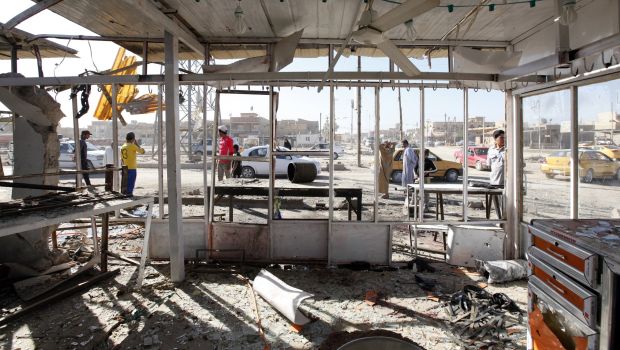
Residents gather at a butcher shop destroyed by a bomb attack a day earlier, in Baghdad’s Husseiniya district on October 8, 2013. Iraqi authorities have executed 42 people on “terrorism” charges following some of the bloodiest months in Iraq’s recent history. (REUTERS/Saad Shalash)
The UN mission in Iraq said it was concerned about the executions, which took place on Tuesday and Wednesday, and Amnesty International described the news as “extremely alarming.”
Both urged Baghdad to immediately suspend the death penalty, which rights groups say has been used with increasing frequency by Iraqi authorities in recent years.
Sixty-eight death sentences were carried out in 2011, according to Amnesty.
The 42 hanged this week amounted to almost a third of the total number the campaign group said were put to death in all of 2012, when Iraq ranked third in a list of countries that carried out the most executions, behind China and Iran.
“The criminals were found guilty of terrorist crimes . . . [that] led to the deaths of dozens of innocent citizens, as well as other crimes aimed at destabilizing the security and stability of the country and causing chaos and terror among the people,” Minister of Justice Hassan Al-Shimary said in a statement.
More than 6,000 people have been killed in attacks across Iraq so far this year, as a Sunni Islamist insurgency that includes attacks by Al-Qaeda gains momentum.
After invading Iraq in 2003, the US-led interim authority suspended the death penalty, citing its use as a tool of repression under dictator Saddam Hussein, who left behind mass graves filled with thousands of bodies.
But as sectarian carnage began to take hold of the country in 2005, Iraq reinstated the punishment for those who commit “terrorist acts”, as well as people who provoke, plan, finance and enable others to perpetrate them.
Kidnapping and murder, but also lesser offenses like damage to public property, in certain circumstances, are also punishable by death.
Members of Iraq’s Sunni Muslim minority accuse the Shi’ite-led government that came to power after Saddam’s overthrow of using the death penalty to persecute their sect.
The ministry did not announce the names of the 42 executed this week, nor their religious affiliation.
A raid by Iraqi security forces on a Sunni protest camp in April touched off a backlash by militants that is still ongoing.
“The escalation in the number of executions in recent days is an extremely alarming development,” said Amnesty’s Middle East and North Africa Deputy Director Hassiba Hadj Sahraoui in a statement. “Death sentences continue to be imposed after grossly unfair trials.”
